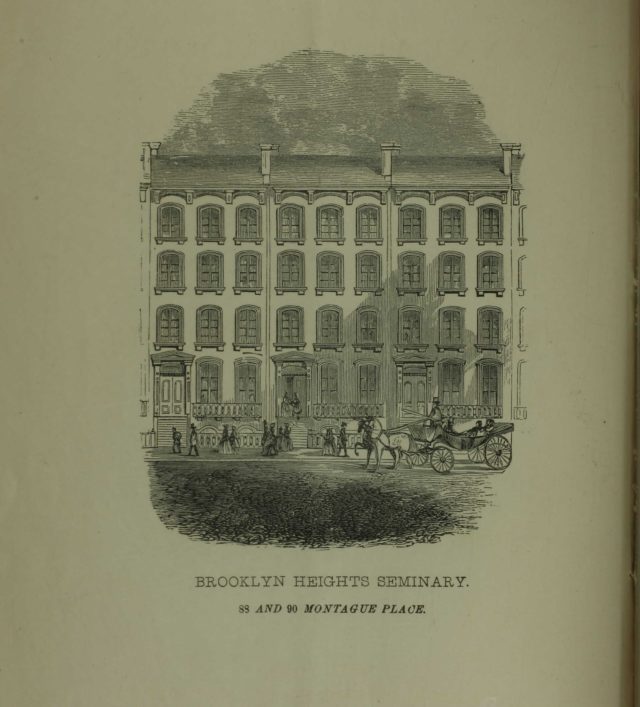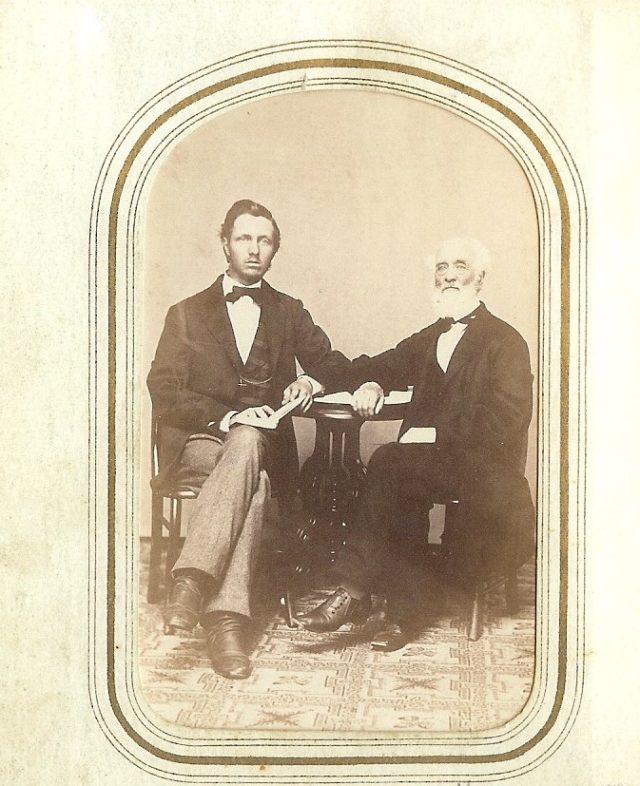“From a Land of Slavery to One of Freedom”
Lavinia Goodell grew up in a household imbued with the notion of equal rights for all, and throughout her life she was at ease with people who were different from herself. One of her classmates at the Brooklyn Heights Seminary in the 1850s was a girl from the south.

Here is how the schoolmate recalled Lavinia:
Soon I learned that Miss Goodell was considered the orator of the class, and one of the best scholars in the school. I was told that she was a great abolitionist and as I was from the south and the daughter of a slave holder, I did not expect her friendship. To my surprise, she took me at once under her wing, and was one of my best friends.
While at the Seminary, Lavinia wrote a paper titled “The Responsibility of the North for Slavery” in which she said:
The North being a majority have more power than the South, i the election of rules; they are therefore responsible for slavery if their power is not exerted against it. If the North, however, had no political power its duty would be to bear testimony against slavery, to cast its influence for Freedom.
She also wrote a short story titled “The Underground Railroad: a Fairy Tale” in which she told of a young slave named Rosa who, with the help of a benevolent fairy, descended through a trap door and boarded a subterranean train where she was reunited with her parents and eventually delivered safely across “the falls of Niagara” “from a land of slavery to one of freedom” – “ Canada. (Click here to read the full story.)
In 1862, during the Civil War, Lavinia wrote to her sister and described going to a lecture given by a missionary and an escaped slave, who was referred to as “contraband.”
We went over to Dr. Cheever’s church last Monday eve. to hear Mr. Lockwood, the missionary to Fortress Monroe, and the “contraband,” William Davis, whom he has brought to the north to stir up the people in behalf of that class. He (the contraband) is about 45 years, and succeeded well in entertaining the large audience. He has always been a slave, and told his story, of course in rather a crude manner, but with force and originality, in some parts very witty and in others with great pathos. I admired him very much, and Mr. Lockwood, too…. Thursday evening we spent at Mr. Jocelyn’s, where we again met Mr. L. and “contraband,” also a colored woman of whom you may have heard, who has been down to the south nine times and brought up fugitive slaves, and who interested and amused us much with some stories of her adventures.
Soon after the war ended, William Goodell, Lavinia’s father, wrote her:
Besides the mss I sent to the Principia for publication, there is a printed statement … written by the author of “Among the Pines” in which he relates how he was present at the headquarters of General ____ when a Negro delegation arrived, unfolding a plan they had for assisting in putting down the rebellion in two months (this was in 1862). They had already procured the approbation of the plan by 5 out of the 10 or 11 prominent generals, who all regarded it as perfectly feasible. General ____ agreed with them on that point but was horrified at the thought of having so many black men let loose among white men. So messages were dispatched … to have the thing stopped. And, accordingly that was the last of it. I think it high time that the fact … should be more prominently before the public, with suitable comments.
The Goodell family’s egalitarian views carried on to the next generation. In 1866, when Lavinia’s sister gave birth to a third son, her elder sons had suggestions for what name to give the baby. “William (age 12) says call it Thad Stevens. Lewis (age 6) says call it Fred Douglass.” In 1868, William Goodell wrote to Lavinia in praise of his grandson, William Goodell Frost (who would later become the president of Berea College):

William, it seems is getting to be quite literary…. His mother writes us an extract from a composition of his, “National History,” in which he says “That we can suppress internal disturbance is proved beyond a doubt, but, have we strength to punish the most foul of felons remains to be seen.” Felons who can never, in this world or the next, receive a sufficient amount of punishment and will we keep our solemn promise to make the Negro a citizen as he has made himself a soldier.” Etc. etc. Quite a precocious youth of 13 summers.
Sources consulted: Life of Lavinia Goodell, Maria Frost, unpublished biography, from the William Goodell Family Papers at the Special Collections & Archives, Berea College, Berea, Kentucky; Letter from Lavinia Goodell to Maria Frost, January 18, 1862; Letters from William Goodell to Lavinia Goodell (July 13, 1865; February 15, 1868); Letter from Clarissa Goodell to Lavinia Goodell, April 10, 1866; The Responsibility of the North for Slavery; The Underground Railroad: a Fairy Tale. Photo of William Goodell and William Goodell Frost courtesy of Beverly Wright.







